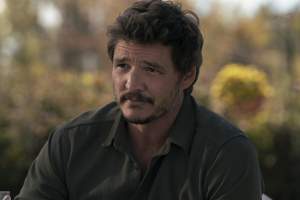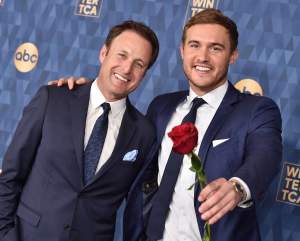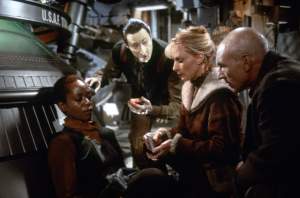The Adventures of Pete & Pete

MoviePics1001/moviestillsdb
Easily the greatest live-action children’s television show ever made. The Adventures of Pete & Pete is the brainchild of writers Will McRobb and Chris Viscardi and starred Danny Tamerelli and Michael Maronna as the titular brothers Pete. The show began life as a series of interstitial shorts on Nickelodeon to fill out 30-minute programming blocks, then a handful of specials before getting a three-season run on the kid-centric network in the early 1990s.
The show had a surrealist, cartoon sensibility but could also be quite sweet and whimsical, life-watching someone’s memories of a strange idyllic 80s childhood somewhere in the Midwest.
Begging them to release the 3rd season on DVD. Legend has it they were pressed and packaged and are sitting in a warehouse somewhere.
Get Smart

pmv79/moviestillsdb
Get Smart ran for five seasons in the 1960s, and in addition to being a stupidly funny parody of spy dramas also has one of the most iconic opening credit sequences in television history. The series was created by Mel Brooks and Buck Henry and is very similar in style and sensibility to Brooks’ best films.
We follow the misadventures of Agent 86 Maxwell Smart, a spy under the employ of the secret United States counterintelligence agency CONTROL, who each week battles the forces of KAOS, a generically evil organization bent on…being evil.
Silly gadgets, bubbling spycraft, and an excellent 30 minutes of television.
The Fresh Prince of Bel-Air

MoviePics1001/moviestillsdb
You know the premise: a kid from Philadelphia got in a fight after a game of basketball and his mom shipped him off to live with his rich aunt and uncle’s family out in beautiful, bougie Bel-Air. Predictably, it’s a real culture shock scenario. If you ever forget just listen to the theme song — it’s one of the best in the history of the medium.
The show launched the career of Will Smith who in minute one of this series is an instant megastar. The show still holds up, and even the corny “message” episodes still work, either because of the chemistry of the cast or through the sheer will of Smith’s charisma.
NewsRadio

diannecan/moviestillsdb
Created by Paul Simms, NewsRadio is a wickedly clever, relentlessly paced workplace sitcom set at the fictional New York news station WNYX. Our entry character is Dave, played by Dave Foley, who in the pilot episode is hired on as the new news director and must learn to manage the big personalities at the station in addition to the eccentric whims of the station owner.
The series ran for five seasons, though the show was never the same after the tragic loss of Phil Hartman. Jon Lovitz was given the impossible task of trying to fill the giant gap Phil’s passing created, and while he did a fine job there was (understandably) no way to recapture the magic of those first four years.
Taxi

diannecan/moviestillsdb
Don’t let the sleepy opening theme or the dingy sets fool you — it is about the night shift at a cab company, after all — Taxi is just as funny and vibrant today as it was when it first aired forty-plus years ago on ABC (and later, NBC). The cast is an embarrassment of riches. When you have Christopher Lloyd, Danny Devito, Carol Kane, and Andy Kaufman all playing memorable supporting roles you know you’re in good hands.
The show was also more than just a joke delivery device and often examined the existential wants and needs of its characters as well as any primetime drama
The Larry Sanders Show

zane/moviestillsdb
The Larry Sanders Show is such a criminally underrated sitcom. The show is a satirical look at how the sausage is made on late-night television and features dozens of celebrity cameos playing exaggerated or twisted versions of themselves. The show cleverly mixes video (for the talk show portions of the episode) and film (for the backstage, “off-camera” scenes) to show how one influences the other. The three leads — Gary Shandling, Rip Torn, and Jeffrey Tambor — have incredible chemistry, and the supporting cast and writing staff are full of talented comedians and future stars. The series also concludes with one of the great final episodes in TV history.
Frasier

moviepics1001/moviestillsdb
Perhaps the most successful spin-off this side of the Special Victims Unit, Frasier has aged exactly like the kind of fine wine that Dr. Crane’s brother Niles might gloat about serving at a successful dinner party.
The sitcom is an excellent mix of high and low humor, and the writers of the show make the smart choice to often have the stuffy and pretentious Crane boys as the butt of the joke. The series also uses Frasier’s profession as a psychiatrist not to make cheap jokes about his call-in patients, but instead to show the doctor’s eccentricities and biases. Would-be sitcom writers should study the show’s well-structured scripts, it doesn’t get much better than this.
Cheers

mdew/moviestillsdb
The genius of Cheers is how it can replicate the vibe of stopping off at your local watering hole and washing the day’s problems down with a cold one among friends — all without leaving your home or dealing with a long tab or a rough hangover.
Cheers is two shows in one. The first few seasons are more grounded and focus on the will-they-won’t-they of Sam and Diane. The second half gets much broader and feels more modern. Both versions are great, and Cheers holds up surprisingly well on a rewatch outside of some of Sam’s over-the-top womanizing.
I Love Lucy

diannecan/moviestillsdb
The biggest hurdle I Love Lucy has in appealing to a modern audience is that it was so successful and influential in its time that many of its best jokes and gags have been borrowed, referenced, or straight-up stolen so many times as to feel trite.
What a great problem to have.
Lucille Ball is a one-of-a-kind physical comedian, able to get a huge laugh out of an odd facial expression or a fall as good as anyone who’s ever done it, and every episode is a showcase of those talents. A timeless actor showcased perfectly in a timeless series.
Seinfeld

Carlito/moviestillsdb
Oddly, the sitcom has the reputation of being a “show about nothing” when it’s quite clear what the show is about: Seinfeld is a show about how a comedian gets his or her material. We see Jerry and his friends living their lives and how those stories influence Jerry’s actions. Even when the “standup” wraparounds were dropped the subtext was still there.
Either way, Seinfeld remains one of the if not the best sitcom ever made. Even the lesser seasons, when Larry David left the show and Jerry was able to indulge in his more Looney Tunes-esque sensibilities, are still funnier than most other shows on their best day.







